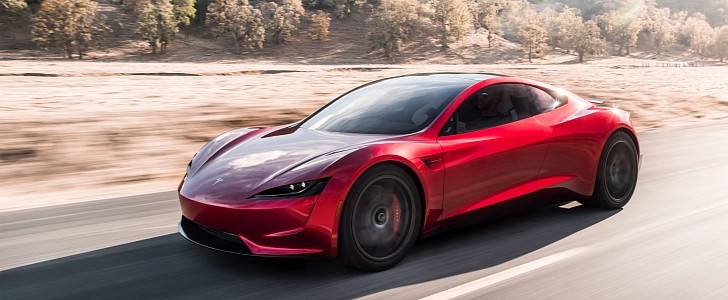We never really had a geek at the head of a car company before, which is probably why the automotive industry has been so very predictable and, for most of the time, boring throughout the years.
Sure, there have been plenty of really fast or incredibly beautiful cars, but we never got something that was truly special. You know, something like rocket propulsion on a series model. Thank God for Elon Musk and his delight in dropping some apparently ridiculous claims completely straight-faced, only to go on and bring them to market later on as promised, if not slightly improved.
When the upcoming Roadster first showed up - during the same event that introduced the Tesla Semi - it came with some really crazy numbers. Musk promised 620 miles (1,000 km) of range, 10.000 lb-ft of torque (that was later revealed to be wheel torque, so not THAT crazy), and a 0-60 mph (0-97 km/h) acceleration time of just 1.9 seconds. Most CEOs would have left home satisfied that night, and so did Elon. Not because he was happy with the numbers, but because he knew something we didn't.
That would be the SpaceX package: a set of cold-gas thrusters - with some hidden behind the Roadster's rear license plate (yes, he's aware of any James Bond reminiscence) - that help with the vehicle's acceleration to a yet unspecified degree. Enter Jason Fenske, the man behind the Engineering Explained YouTube channel, and the only person who can make a whiteboard full of math look interesting and appealing. Unlike your high school teacher.
Using the little information we have on the future Tesla Roadster, he managed to come up with a math-backed acceleration figure of 1.1 seconds for the 0-60 mph sprint. Needless to say, that would be enough to end any drag race before it even started, essentially turning the Roadster into the pro no amateur wants to compete against. Not that most people are in any hurry to race them now either.
Jason began by calculating the EV's mass, which turned out to be 4,400 lbs or 2,000 kg. He rightly points out that such a low figure is highly unlikely and expects the Roadster to weigh more, but also produce more than 10,000 lb-ft of wheel torque. However, since that's the result based on the available official info, it's what he bases the rest of his calculations on. Watch the clip below for the full explanation.
When the upcoming Roadster first showed up - during the same event that introduced the Tesla Semi - it came with some really crazy numbers. Musk promised 620 miles (1,000 km) of range, 10.000 lb-ft of torque (that was later revealed to be wheel torque, so not THAT crazy), and a 0-60 mph (0-97 km/h) acceleration time of just 1.9 seconds. Most CEOs would have left home satisfied that night, and so did Elon. Not because he was happy with the numbers, but because he knew something we didn't.
That would be the SpaceX package: a set of cold-gas thrusters - with some hidden behind the Roadster's rear license plate (yes, he's aware of any James Bond reminiscence) - that help with the vehicle's acceleration to a yet unspecified degree. Enter Jason Fenske, the man behind the Engineering Explained YouTube channel, and the only person who can make a whiteboard full of math look interesting and appealing. Unlike your high school teacher.
Using the little information we have on the future Tesla Roadster, he managed to come up with a math-backed acceleration figure of 1.1 seconds for the 0-60 mph sprint. Needless to say, that would be enough to end any drag race before it even started, essentially turning the Roadster into the pro no amateur wants to compete against. Not that most people are in any hurry to race them now either.
Jason began by calculating the EV's mass, which turned out to be 4,400 lbs or 2,000 kg. He rightly points out that such a low figure is highly unlikely and expects the Roadster to weigh more, but also produce more than 10,000 lb-ft of wheel torque. However, since that's the result based on the available official info, it's what he bases the rest of his calculations on. Watch the clip below for the full explanation.


